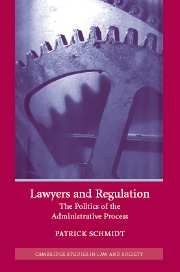Book contents
- Frontmatter
- Contents
- List of figures and tables
- Table of cases
- Acknowledgments
- List of abbreviations
- 1 Introduction
- 2 The contours of a regulatory bar
- 3 Administrative rulemaking
- 4 Rulemaking litigation
- 5 Enforcement
- 6 Regulatory counseling
- 7 Conclusion
- Appendix 1 Research methods
- Appendix 2 Survey instrument
- Notes
- Bibliography
- Index
5 - Enforcement
Published online by Cambridge University Press: 11 July 2009
- Frontmatter
- Contents
- List of figures and tables
- Table of cases
- Acknowledgments
- List of abbreviations
- 1 Introduction
- 2 The contours of a regulatory bar
- 3 Administrative rulemaking
- 4 Rulemaking litigation
- 5 Enforcement
- 6 Regulatory counseling
- 7 Conclusion
- Appendix 1 Research methods
- Appendix 2 Survey instrument
- Notes
- Bibliography
- Index
Summary
Enforcing OSHA standards can seem a world away from the cauldron of administrative rulemaking. Policies that began as general goals in congressional mandates face particular problems in workplaces, and as conflict becomes fixed on a private firm, the process shifts from the quasi-legislative to the explicitly prosecutorial. Yet, since policymakers cannot imagine all the discrete cases that a statute and its rules must address, the resolution of OSHA enforcement disputes is united with rulemaking in one passage: both phases involve the creation of law, not “merely” its administration or implementation. Public officials inherently hold some scope for discretion as individual cases are brought within wider frameworks of governance. With each case, as with each new rule, the law advances or retreats interstitially.
Regulatory enforcement by the state and, as discussed in chapter 6, corporate decisions about compliance, are as complex as any problems in the administrative state. For more than two decades, scholars from around the world – particularly Common Law countries – have devoted enormous effort to understanding and improving the impact of regulation in practice. The result has been the recognition that simple models of public–private interaction are difficult to sustain. Law cannot be said to be authoritative in any pure sense, yet neither is compliance with the law simply a matter of opportunistic cost–benefit analysis by corporate actors.
- Type
- Chapter
- Information
- Lawyers and RegulationThe Politics of the Administrative Process, pp. 137 - 185Publisher: Cambridge University PressPrint publication year: 2005



